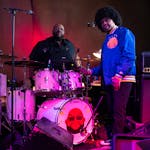HIP-HOP
J. Cole, "KOD" (Dreamville Records)
Where is rap-Switzerland and how much are the flights? Asking for a friend, and really for all of our friends, because J. Cole just dropped a new album last Friday, which means it's time for everyone with ears and a Twitter handle to pick a side in the year's hottest fight over the year's lukewarm-est rap music.
At the center of this war zone stands a man alone, tripling down on his mythology as a rapper/producer who doesn't need anybody's help. After his self-produced, guest-free 2014 album, "Forest Hills Drive," moved a million units, Cole's most devout vassals blasted their rally cry across social media — "J. Cole went platinum with no features" — until it became scripture. Now the superfans' meme is the rapper's mantra, and on his new album's title track, "KOD," Cole is quick to remind us that other rappers "ain't worthy" of appearing next to him in song. Maybe that's just good, old-fashioned, reflexive braggadocio blab — but it's starting to feel a tiny bit sociopathic.
Plus, if your music is the pure, unadulterated expression of your own beautiful mind, you'd better have some wild hieroglyphs up on your chalkboard. Instead, Cole's pontifications on "KOD" continue to fulfill the world's most conservative expectations of what virtuous rapping should sound like. He praises women who are "sexy, but never show too much." He knows that money is overvalued because you "can't take it when you die." And when his friends disappoint him, Cole promises to "be the bigger man, just like I always be." Instead of plugging the empty spaces between his lines with ad-libs, he graciously provides moments of silence for the listener to say, "Whoa, that's deep."
Deep thinkers should give us the bends, but Cole only ever gives us clarity, telegraphing his rhymes, spraying down ambiguity like he's dusting crops. To his flock, that certitude must feel reliable, comforting, centering. To those who can't stand him, it feels inflexible, corny and pedantic. But maybe we can at least agree on why we all love or hate J. Cole: His songs mean what they say, and nothing more.
At least the music itself on "KOD" has a spongier feel, with the rapper softening his articulation to match the elastic contours of his tracks. Unfortunately, the sounds oozing out of Cole's mouth are also words, and too often, they seem to drip down from some bogus moral high road.
That drip turns to a fire-hosing when the album reaches its coda, "1985 — Intro to 'The Fall Off,' " during which Cole calls all of the boisterous young rappers currently blowing out speakers on SoundCloud into the principal's office. "I ain't judging you," Cole raps at one point, and then the next: "I hope for your sake you ain't dumb as you look."
He sounds energized, sure, but he ultimately sounds afraid — just like Jay-Z did in 2009 with "D.O.A. (Death of Auto-Tune)." So if you're into anxious rap superstars who make music out of their condescension to another generation's youthful hyper-vision, here's another track for your funky little playlist. For the rest of us, "1985" only reinforces what we already knew: An unimaginative rapper is primarily an unimaginative listener.
Chris Richards, Washington Post
new releases
• Godsmack, "When Legends Rise"
• Janelle Monáe, "Dirty Computer"
• Keith Urban, "Graffiti U"
• Post Malone, "Beerbongs & Bentleys"
• Willie Nelson, "Last Man Standing"




